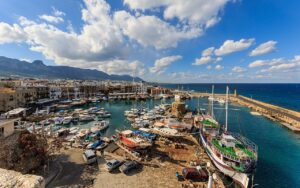Was Turkish Cypriot tycoon Asil Nadir a ‘hero’ or a crook?

Subscribe for free for twice-weekly true crime articles or become a paid subscriber to get premium content – https://totalcrime.substack.com/
By Chris Summers 15 February 2025
In May 1993 it emerged a British government minister had given the Turkish Cypriot tycoon Asil Nadir a watch bearing the inscription: “Don’t let the buggers get you down”.
That same month Nadir – wanted in Britain over the theft of millions from his company, Polly Peck International – fled to the Turkish Republic of Northern Cyprus (TRNC), a nation which was only recognised by Turkey*.
Nadir died on Sunday (9 February), aged 83, and in today’s Substack I will recall his colourful life and also explain why for a time the TRNC was a haven for British criminals.
Ipek Ozerim, the London-based editor of T-Vine magazine, told me: “For Turkish Cypriots, Asil Nadir will always be a hero for bringing hope and opportunity to their internationally isolated homeland of North Cyprus.”
Asil Nadir was born in Lefka, on the north coast of Cyprus in 1941, the son of a modest Turkish Cypriot businessman, and grew up in the Agios Loukas district of Famagusta.
He had several Greek Cypriot friends at school and never espoused nationalist views.
People who knew him say politics always played second fiddle to money.
In 1959 his parents moved to London and his father, Irfan Nadir, started a business manufacturing clothes.
Asil joined the business and then set up his own company, manufacturing cheap clothes in northern Cyprus and selling them at a big profit in London.
The island of Cyprus had been part of the British Empire until 1960 when it became independent but in 1974 Turkey invaded to protect the island’s Turkish Cypriot majority, who were threatened with ethnic cleansing when Greek Cypriot extremists took over and tried to merge it with Greece.
The Turks conquered the northern third of the island, which became ethnically divided between the Turkish Cypriot north and the Greek Cypriot south.
In 1983 the Turkish Cypriot leader Rauf Denktash created the Turkish Republic of Northern Cyprus (TRNC), which still exists to this day, although it has only been recognised as a country by one nation – Turkey.
In 2012 I wrote this article about Nadir, which was written after his trial at the Old Bailey.
Giving evidence at the trial, Nadir had explained: “After the war the island was split into two. There was a population exchange. All the Turks in the south went to the north and the Greeks in the north went to the south.”
Greek Cypriot owners left behind hotels, citrus groves, factories and warehouses but the TRNC’s economy was in a mess and the area was short of entrepreneurs.
Step forward Asil Nadir.
He explained to the jury: “The government in the north created property points that were given to people who were displaced from their previous areas. Property points were like title deeds and you could acquire the properties [the Greek Cypriots had left behind].”
“There was a legal market in Cyprus which my family was involved in,” said Nadir, who denied any impropriety.
But Costas Apostolides, an economist and journalist with the Cyprus Mail, who I interviewed in 2012, viewed it very differently.
He told me: “He (Nadir) received various properties for virtually nothing. Initially it was citrus-growing areas and later hotels and a large complex of flats in Kyrenia.”
Mr Apostolides said Nadir had been given large tracts of land at Alacati (Alagadi) and Voukalida (Bafra), both of which had “fantastic potential” for tourist development.
“This land belonged to displaced people. They have not cost [the Turks] anything and you are then giving them to somebody else to exploit,” he added.
Nadir’s trial – which I covered – was shown a glossy promotional video, made in 1989, which featured both the Palm Beach Hotel in Famagusta and the Jasmine Court apartment complex in Kyrenia (Girne in Turkish, pictured below).

In 1980 Nadir acquired a London rag trade company, Polly Peck International (PPI) and over the next decade he would turn it into a huge conglomerate with interests in fruit juice, packaging, bottled water and televisions.
The 1980s, with Margaret Thatcher at the helm and a highly aspirational culture on the rise, was a decade where people were encouraged to get rich quick, often at the expense of others.
Asil Nadir became the darling of the City of London and shares in PPI went through the roof.
Between 1985 and 1990, Nadir secretly donated £440,000 to the Conservative Party, which won elections in 1983, 1987 and again – without the deposed Mrs Thatcher – in 1992.
But Nadir was heading for a fall.
He expanded PPI too rapidly, acquiring the Del Monte fruit brand in the United States, and taking over a Japanese TV manufacturer, Sansui, but the foundations of PPI were built on sand.
In October 1990 PPI collapsed, owing £550m.
It was alleged Nadir had siphoned off huge sums and sent them back to the TRNC.
The Old Bailey was told PPI was owed, on paper, £439m by a subsidiary in the TRNC called Unipac.
But the court was told when administrators checked Unipac’s accounts they “effectively found no cash at all, just a black hole”.
In May 1993 Nadir – awaiting trial in London – skipped bail and fled back to the TRNC, where his old friend Mr Denktash refused to extradite him.
Michael Mates was a Northern Ireland minister at the time.
I knew him a little because he was the Tory MP for East Hampshire and I had worked in that area in the early 1990s, as a reporter for the Petersfield Herald.
I covered the general election count in April 1992 when Mr Mates – whose son was later to become ITV correspondent James Mates – racked up 47,541 votes.
Stanley Hale, a retired railwayman and devout communist, standing as an independent, got 165 votes.
Mr Mates – who had an armed police guard because of the threat from the Provisional IRA – was a former army officer himself, who spent 20 years in uniform and left with the rank of lieutenant colonel.
In May 1993 one of the newspapers reported Mr Mates had given his friend, Nadir, a watch with the inscription: “Don’t let the buggers get you down.”
On 29 June 1993, after weeks of pressure, Mr Mates finally resigned.
Betty Boothroyd – who died in 2023 – once said her worst moment as Speaker of the Home Of Commons came during Mr Mates’ resignation speech.
At the time Nadir was a fugitive from justice and as Mr Mates made his 29-minute speech, Miss Boothroyd repeatedly interrupted him and accused him of breaching the Contempt of Court Act.
His 28-minute resignation speech is recorded for posterity in Hansard, and in it he said: “I do not know whether Mr Asil Nadir is innocent or guilty.”
“No part of any of my representations has sought either to plead his innocence or to try to establish it. That is for the courts,” he added.
“Those who have alleged that I was trying to help him to escape from the consequences of any of his actions have totally misunderstood what I have been trying to do,” said Mr Mates.
He then proceeded to go into great detail about the case against Mr Nadir, which was at the time sub judice because he was still awaiting trial.
Mr Mates said: “Mr Nadir and his advisers believe that he has been denied the opportunity properly to prepare his defence. They also believe that he has in the process been denied his rights under the law.”
The indomitable Betty Boothroyd then interrupted him and remind the “honorable gentleman” of the parliamentary rules.
Mr Mates replied: “I have had this script looked at very carefully by a senior lawyer with exactly that in mind.”
But he then went into more detail about alleged legal discrepancies involving Mr Nadir’s case and Miss Boothroyd again interrupted him and eventually ordered him to sit down.
Mr Mates then said: “Surely we are here, either as front- or backbenchers, to take up questions of apparent injustice, and if we should ever flinch from such a duty the reason for our existence as Members of Parliament would be much diminished.”
The former minister said he had been “guilty of one foolish indiscretion” but said he had “done nothing else improper” and concluded: “When this whole story is told, this House will consider that throughout this affair I have acted as an honourable Member.”
It would be almost 20 years before Asil Nadir finally faced justice.
The TRNC had no extradition treaty with the the UK and for years, partly as a result of the publicity about Asil Nadir, it became a haven for British criminal fugitives.
In the late 1990s and early 2000s a number of criminals holed up there, including drug smuggler Brian “The Milkman” Wright.
In November 2009 I visited Cyprus and wrote this article about the island’s bloody past and the prospects of it being reunited. During that trip I interviewed the then President of the TRNC, Mehmet Ali Talat, who was upbeat about the future. Sadly, 16 years later, there is no political solution in Cyprus.
In 2010 I wrote this article about how the TRNC was no longer a fugitive for criminals and they were bending over backwards to help the British and other police forces looking for fugitives.
The TRNC even offered to sign an extradition treaty with the UK, but the British government refused, because it did not want to offend Cyprus or Greece.
In 2007 drug dealer Miran Thakrar fled to northern Cyprus after he and his brother committed a triple killing in Bishop’s Stortford, Hertfordshire.
The police not only detained him and escorted him back to Britain but also sent over officers to testify at his trial, which I covered. Miran and his brother Kevan were both jailed for life.
Nadir eventually flew back to London voluntarily in 2011 and the following year he was convicted of 10 counts of theft after a seven-month trial, and was jailed for 10 years.
His glamorous second wife Nur – several decades younger than him – stood by him throughout.
The jury at Old Bailey was told he had stolen more than £100m from PPI between 1987 and 1990, and fed it back to banks in the TRNC.
In his sentencing remarks, Mr Justice Holroyde said: “Asil Nadir, you are a man of outstanding business skills, and in the 1980s you achieved remarkable success. In a decade you developed Polly Peck International plc into a multi-national business.”
“You no doubt brought employment and financial benefit to many persons around the world. You are entitled to take great pride in that achievement. The company’s success was in many ways your success. But the company’s money was not your money. You knew that. You nonetheless helped yourself to it. You committed theft on a grand scale,” said the judge.
In April 2016 the British government agreed to transfer Asil Nadir to Turkey, where he was due to serve out the remainder of his sentence.
But he was immediately released and allowed to return to the TRNC, where he still had considerable business interests.
In December 2022 Nadir sold the Cyprus Today newspaper and Kibris Media Group, which he had set up in 1989.
He issued a statement at the time, which was reported by Cyprus Today, which was quite revealing about his personality and his feelings about Turkish Cypriots.
He said: “As a child of this land I have always been sure that our people can achieve success on a global scale.”
“At one time a significant proportion of almost every household’s earnings came from our investments. This was not by accident,” said Nadir.
Then, explaining why he was bowing out of the media industry, he said: “Aiming beyond the borders of our country, I will make investments and initiatives with bigger economic goals.”
“In this context, we will see the activity of my work, we will reap the rewards together, just as has been the case since the 1980s,” he concluded.
It’s not clear what he was talking about, but Nadir’s death this week has brought down the curtain on a remarkable career, and on a fascinating era in the history of Cyprus.
John Hughes-Wilson, an author and friend of Nadir’s, wrote a comment on The Times’ story about Nadir’s death.
He said: “He fell foul of the Americans when he bought Monsanto Fruit (sic) and upset them when he queried their accounts, which included secret CIA payments to South American rebels.”
Mr Hughes-Wilson added: “His problem was he ran Polly Peck as his personal company, not grasping that he was chairman of a board. Britain’s MI5 conspired to lure him back to the UK with false promises on which the UK establishment nicked him.”
Earlier this week Asil Nadir’s British lawyer, Giles Bark-Jones, said: “Right up until the day he died Asil protested that he was innocent and had been wrongly convicted.”
“After his conviction the Serious Fraud Office suddenly found boxes of evidence relating to the case and those were the basis of his appeal to the CCRC,” he added.
In a tribute to his former employer, journalist Serhat Incirli wrote that Asil Nadir’s biggest mistake was not “selling out Turkish Cypriots” despite clear pressure for him to do so, adding that had the business mogul set aside his identity and roots, “perhaps he would now be playing in the same league with Elon Musk.”
Ipek Ozerim told me: “Dubbed ‘the man with the Midas touch’ for his vast business empire, Mr Nadir poured millions into multiple industry sectors, such as agriculture banking, construction, textiles, and tourism, which in turn helped transform this small, underdeveloped territory in the Eastern Mediterranean into a fledgling state.”
She said: “At the peak of Polly Peck’s fortunes, every Turkish Cypriot I knew wanted to work for him — and many did, including the current TRNC President Ersin Tatar. Those who knew him personally speak of his ambition and vision, as well as his charm and benevolent character — he was as much a big brother as he was a boss to his staff, whilst his generous donations supported those in the arts, charities and wider community.”
Ms Ozerim said: “His Kibris Media Group schooled hundreds of newly graduated reporters, turning the best of them into household names. Launched in 1989 and printed in colour using the latest technology, Kibris newspaper quickly became the country’s leading daily that was read by most of the population, giving it unparalleled reach and influence. One of the most significant examples was in 2004, when Kibris backed UN efforts to reunite Cyprus ahead of the island-wide referendum despite another iconic Turkish Cypriot, President Rauf Denktash, being vehemently against it, yet 65 % of Turkish Cypriots voted in favour of the Annan Plan.”
She said Mr Nadir knew the “power of media”, but also respected the principles of free speech and hired writers and TV presenters who held “diametrically opposing views” and gave them the “space to express their ideas.”
Ms Ozerim was a columnist for his weekly paper Cyprus Today, between 2006 and 2020 and she said: “I was never once censored, despite my repeated criticism of TRNC and Turkish governments and politicians, and on one occasion the big boss himself.”
“Perceptions matter and I was unimpressed when Mr Nadir showed complete indifference to the fact that the UK was in the middle of a severe recession when he returned there to face justice in 2010. If ever there was a time for modesty and humility, this was it, but instead the former ‘Sultan of Belgrave Square’ and his young wife Nur flaunted their Mayfair lifestyle whilst applying for legal aid – points I made very explicitly in my column. Not a single word I wrote was changed before it went to print,” she told me.
Ms Ozerim said: “For sure Mr Nadir was no angel, but he was no worse than the other British business tycoons who broke corporate rules in the 1980s. Perhaps he should have stayed and faced the music instead of fleeing Britain in 1993, but Mr Nadir genuinely believed – as do many Turkish Cypriots – that he would not have faced a fair trial having upset American and Greek Cypriot interests.”
EPILOGUE – Times have certainly changed in the TRNC. In December 2024 Mehmet Ali, 26, was arrested in the TRNC on suspicion of murdering Ismail Tanrikulu, 22, in Tottenham cemetery in north London in 2018. The Metropolitan Police said: “The arrest follows close working between the Met, the National Crime Agency and the Turkish Cypriot Police in order to make the arrest and support the victim’s family.” They said Ali would face trial for Tanrikulu’s murder in northern Cyprus, with Met detectives no doubt flying out to supply the evidence.
* On Wednesday (13 February) Pakistan became the second country to formally recognise the TRNC.






